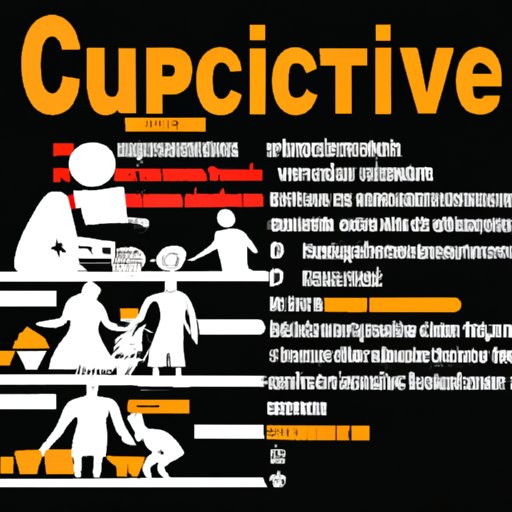Introduction
The culture of poverty is a social phenomenon that has been around since the 1960s. It refers to a set of behaviors, values, and beliefs that are passed down through generations of people who live in poverty. These behaviors, values, and beliefs can have a significant impact on an individual’s ability to break out of the cycle of poverty. In this article, we will explore what the culture of poverty is, analyze its causes and effects, investigate how societal structures perpetuate it, and look at possible solutions for overcoming it.

Analyzing the Causes and Effects of the Culture of Poverty
The culture of poverty is often determined by one’s level of income. Those with lower incomes are more likely to experience the culture of poverty than those who come from wealthier backgrounds. According to a study conducted by the National Poverty Center, individuals living in poverty are more likely to be exposed to conditions such as inadequate housing, poor nutrition, and limited access to healthcare and education, which can lead to a lack of opportunity and resources needed to escape poverty.
Education is a key factor in breaking out of the cycle of poverty. Studies have shown that individuals who obtain higher levels of education are more likely to experience upward economic mobility. Education provides individuals with the skills, knowledge, and resources needed to succeed in the workforce, which can help them break out of the cycle of poverty. Additionally, educational attainment has been linked to better physical and mental health outcomes.

Investigating How Societal Structures Perpetuate the Culture of Poverty
Societal structures also play a role in perpetuating the culture of poverty. Media portrayals of the poor often reinforce negative stereotypes, which can lead to further marginalization and discrimination. This can make it more difficult for individuals living in poverty to access resources and support needed to break out of the cycle of poverty.
The intersection of race, gender, and poverty can also contribute to the culture of poverty. Studies have found that certain demographics, such as women and people of color, are more likely to experience poverty and its associated challenges. This can create additional barriers to economic mobility, making it even more difficult to break out of the cycle of poverty.
Solutions for Overcoming the Culture of Poverty
There are several solutions for overcoming the culture of poverty. Empowering communities to address the issue is one way to combat the problem. This can include providing access to resources such as job training, financial literacy, and health education. Additionally, community-based initiatives such as mentorship programs and social service networks can help individuals living in poverty gain the skills and resources needed to break out of the cycle.
Government programs that provide assistance to low-income individuals can also be beneficial. These programs can include things like food assistance, housing subsidies, and employment services. Private organizations can also provide resources for those in need. Nonprofits and charitable organizations can offer access to job training, educational opportunities, and other forms of assistance.
Conclusion
In conclusion, the culture of poverty is a complex social phenomenon that affects individuals at different income levels. It is caused by a variety of factors, including unequal access to resources and societal structures that perpetuate negative stereotypes. There are several solutions for overcoming the culture of poverty, such as empowering communities, utilizing government programs, and utilizing private organizations. By taking action, we can work towards breaking the cycle of poverty and creating a more equitable society for all.
(Note: Is this article not meeting your expectations? Do you have knowledge or insights to share? Unlock new opportunities and expand your reach by joining our authors team. Click Registration to join us and share your expertise with our readers.)
